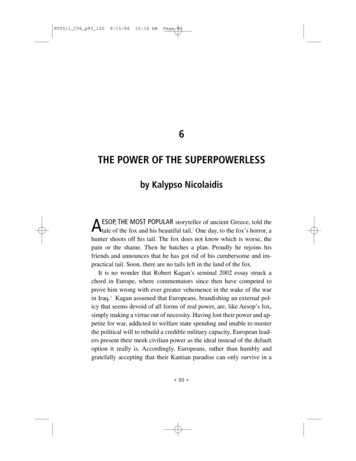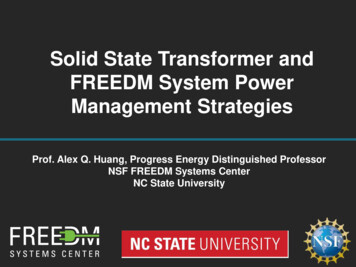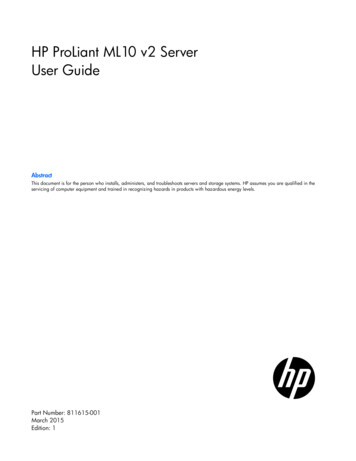
Transcription
RT0511 C06 p93 1209/15/0410:14 AMPage 936THE POWER OF THE SUPERPOWERLESSby Kalypso NicolaidisAESOP, THE MOST POPULAR storyteller of ancient Greece, told thetale of the fox and his beautiful tail.1 One day, to the fox’s horror, ahunter shoots off his tail. The fox does not know which is worse, thepain or the shame. Then he hatches a plan. Proudly he rejoins hisfriends and announces that he has got rid of his cumbersome and impractical tail. Soon, there are no tails left in the land of the fox.It is no wonder that Robert Kagan’s seminal 2002 essay struck achord in Europe, where commentators since then have competed toprove him wrong with ever greater vehemence in the wake of the warin Iraq.2 Kagan assumed that Europeans, brandishing an external policy that seems devoid of all forms of real power, are, like Aesop’s fox,simply making a virtue out of necessity. Having lost their power and appetite for war, addicted to welfare state spending and unable to musterthe political will to rebuild a credible military capacity, European leaders present their meek civilian power as the ideal instead of the defaultoption it really is. Accordingly, Europeans, rather than humbly andgratefully accepting that their Kantian paradise can only survive in a* 93 *
RT0511 C06 p93 1209/15/0410:14 AMPage 9494 * KALYPSO NICOLAIDISHobbesian world thanks to American military strength, fool themselvesinto believing that their own naive view of international affairs can andshould prevail—thus assuming away the huge power differential thatnow exists between the two sides of the Atlantic. To many in the UnitedStates, Europe is not only irresponsible, indecisive, and irrelevant butalso hypocritical.Of course, Europeans must acknowledge that Kagan’s view is righton many counts: that successfully building a zone of peace on their continent colors the way most of them see the world, that Europeans haveachieved this peace under the umbrella of the U.S. security guarantee inthe past half century, that the end of the Cold War has given Europe apeace dividend in contrast to continued military buildup for the UnitedStates, that there are places and instances in the rest of the world wherethe occasional use of military force by outside actors may be legitimate,and that they, the Europeans, have been unable as of yet to forge ameaningful post–Cold War strategy because of their disagreement overwhat such use of force means for them in practice.But what if, beyond these undeniable facts, the tailless fox had apoint? What if Europe’s story of peace building had more relevance forthe rest of the world than the U.S. story of liberal imperialism? What ifnot to be the superpower—or even a superpower—was itself the key toEurope’s international influence? There is no single narrative in Europeto describe and guide this alternative project. Instead there are debatesabout a new European Constitution, a new European army, a newEuropean agricultural policy, and, yes, a new transatlantic bargain.Make no mistake: at the dawn of the third millennium, Europe is reinventing itself as a global actor.The paradox is as follows: for all its brilliant insight, Kagan’s essayfailed to carry through his own ultimate logic. Kagan believes that material conditions determine the ideological superstructure: theEuropean view of international relations is the reflection, albeit mythologized, of Europe’s weakness and its place in the balance of power.Moreover, in this classic (Marxist-realist) logic, European consciousness is blind to the very conditions that have led it to believe in the effectiveness of law and negotiation in the conduct of internationalaffairs.3 Yet in the end Kagan calls for Europeans to overcome their
RT0511 C06 p93 1209/15/0410:14 AMPage 95THE POWER OF THE SUPERPOWERLESS * 95psychology of weakness and share the burden of global coercive leadership with the United States.4 This is not a contradiction, as his criticstoo easily like to point out, if one believes that free agency can transcend determinism. And Kagan does recognize that the ideological gapbetween Europe and America has its own role to play in explaining therift. But then because this gap is a function of power differentials, thecircle is complete: weakness causes Europe’s vision, which justifies itsweakness.If the psychology of nations matters, would it not be more consistentto take the Europeans’ claim to relevance seriously? Why assume thatcausality runs only in one direction, that the ideas Europeans hold aboutthe world are only a product and not a cause of its military weakness?If the latter can be the case, why assume a lack of self-consciousness onthe part of Europeans? Why assume that there are no other bases forEurope’s philosophy and behavior than power—or lack thereof? Whyassume that in the post–Cold War era, Europeans would want, if theyonly could, to compete militarily with the United States? And why assume that in the rest of the world beyond “the West,” a world presumably weaker than Europe itself, the materialist logic of history generallyprevails over the institutionalist-idealist logic expounded byEuropeans?When Vaclav Havel wrote The Power of the Powerless twenty yearsago, he may not have predicted the Velvet Revolution of 1989. But hedescribed a world vying under an oppressive superstructure, where thecapacity to connect and communicate with others, the creation of networks of understanding and signs of mutual recognition between apparently powerless individuals shaped an alternative reality where thelong hand of the communist state had little purchase. Could theEuropeans similarly yield their ultimate from exploiting the potentailsof being superpowerless?My aim in this chapter is to suggest that, whatever its own reckoningwith the ambitions of superpowerhood, the United States would greatlybenefit from a new division of labor with Europe, grounded on a recognition of the latter’s comparative advantage; the real question iswhether Europe will want to play. Such comparative advantage rests onthree premises that build on and diverge from Kagan’s account.
RT0511 C06 p93 1209/15/0410:14 AMPage 9696 * KALYPSO NICOLAIDISFirst, today’s Europe is no longer Kantian by necessity, as Aesop andKagan would have it, but by choice. The widening divide between theUnited States and Europe should not be attributed to some born-againEuropean naïveté about power. Rather the divide is both less and moreacute. It is less acute because most Europeans harbor little doubt aboutthe relevance of power to world affairs, in all its forms. Conversely,most Americans believe in multilateral institutions.5 The divide is moreacute, because the European Union (EU), which increasingly shapesEurope’s role in the world, is such a radically different entity from theUnited States.Second, the rest of the world, far from being Hobbesian, is attunedto this European choice because both power and purpose matter in international relations: legitimacy translates power into effectiveness. Insuch a world, the promise held up by the “European difference” is greatand lies in the legitimacy of the narrative of projection that theEuropean Union seeks to deploy, that is, the consistency between its internal and external praxis and discourse. EU-topia is relevant beyondthe shores of its own paradise.Third, perhaps spurred by the fallout of the Yugoslav wars, 9/11, theIraq conflict, and Europe’s own divisions, Europeans are finally starting to engage in a debate not only on how the use of military power fitsthe European Union’s raison d’être but on the relevance of power to theEuropean project. It has been one of Kagan’s great merits to expose theunspoken prejudices, implicit assumptions, and unresolved tensionsunderlying this debate in Europe.THE KANTIAN CHOICEThe European Union, like the United States, was born in opposition toempire. But unlike the United States, this opposition was grounded in acolonial past, that of its constituent member states, which rendered suspect any talk of a civilizing mission as a basis for acting in the world.Indeed, the colonial notion of Europe as a vanguard that may havesomething to teach the rest of the world was the discourse invented todeal with an altogether more powerful underlying factor: Europe’s fundamental security dilemma. This dilemma, the internal power rivalryand conflict between its constituent nations that have plagued Europe
RT0511 C06 p93 1209/15/0410:14 AMPage 97THE POWER OF THE SUPERPOWERLESS * 97for the past four centuries, was exported around the globe—and in theprocess, the European space, self-conceived as the center of the world,became the basis for organizing its periphery.It took two successive continental wars turned world wars to solveEurope’s security dilemma. Initially, with the establishment of theEuropean Community, institutions were created with the ambition oflocking European countries in peace forever through supranational constraints on unilateral policies and the progressive development of community norms. These institutions were indeed Kantian ininspiration—the second Kant, who eschewed the first’s recourse to asupranational government in favor of autonomous republics committedto relating to each other through the rule of law. Progressively, the newunion replaced the old balance-of-power logic with the creation of whatKarl Deutsch called a security community: a group of peoples andstates integrated to such an extent that they derive their security fromeach other.6 Within a few decades, this most ambitious of conflict-prevention projects had made war between European states unthinkable.But only with the end of the Cold War and the last remnant of the oldbelligerencies as they appeared in the breakup of Yugoslavia wasEurope’s security dilemma concluded for good. And with it, grounds inEurope for exporting conflict have simply disappeared.Who denies it? It was the American conventional and nuclear umbrella that allowed Europeans the breathing space for so much fencemending and fence-removing. Without this external military safeguard,it is unlikely that the European community could have been created—let alone evolved into a political union. The creation of a quasi federation without collective security as a driving force was an aberration ofhistory made possible to a great extent by the United States.Ironically, it is precisely at this historical juncture, when Europeansfreed from their internal security dilemma no longer need this ultimatereassurance, that they seem to want to learn anew to project power externally to Europe’s periphery and beyond.7 But in great contrast withthe past era of colonial rivalry, such power projection would be justifiedand sustained not by the need to maintain an internal balance of powerbut by the needs and ambitions of Europe as a whole. What are thoseneeds? Are existing global threats sufficient enough to overcome
RT0511 C06 p93 1209/15/0410:14 AMPage 9898 * KALYPSO NICOLAIDISEuropean historical inhibitions? What can such ambitions be, short of amodernized version of the mission civilisatrice? Can any such ambitionjustify the use of coercive power—by the EU or by its member states?To view Europeans as naive, free-riding wimps preempts the burningquestions that are at the heart of our debates today.To the extent that there exists the beginnings of a European answer,a global European narrative, its seeds have been germinating over thepast half century in an ad hoc fashion, through a learning process thatled Europe to accept and then embrace its distinctive approach to international affairs. Increasingly, Europe’s Kantian approach is notutopian, or second best, but a deliberate choice, the most effective strategy it has found based on hard experience. In short, Europe is no longerKantian because it is weak (militarily that is); it is now weak because itis Kantian.The significance of this distinction should not be underestimated.Historically, relative weakness was a condition forced on countries byeither domestic breakdown or external forces, or a combination thereof,as with the fall of Soviet Union. In contrast, European taxpayers havethe means to provide themselves with stronger defense capabilities, andthey already spend more than twice as much per capita on the militaryas any other power block except the United States. And although part ofthe reason for Europe’s military weakness is no doubt a lingering beliefthat Uncle Sam can always come to the rescue, Americans consistentlyexaggerate the importance of this explanation.CIVILIAN POWER AND THE IMPERATIVE OF CONSISTENCYInstead, Americans need to understand how Europeans are revisitingand reinventing their own collective view on power. Yes, Europeanshave a problem with power. They care about it but are unable (individually) or reluctant (collectively) to project it bluntly. We in Europe havecome up with various labels for the Union reflecting this ambivalence,mitigating the bluntness of the assertion: quiet power, middle power,emancipatory power, postnational power, and, of course, civilianpower. The labels are not simply exultations of Joseph Nye’s soft as opposed to hard power. Nor are they lofty concepts to accommodate thepsychology of weakness. Why would Europeans stop at that? Be they
RT0511 C06 p93 1209/15/0410:14 AMPage 99THE POWER OF THE SUPERPOWERLESS * 99the arrogant French, the ambitious British, the cosmopolitanScandinavians, the globally trading Dutch, the idealist Germans, or theSpanish or Greeks with their far-reaching networks, most European nation-states do not restrict their self-definition to the shores of Europe.The European unease with power is part and parcel of a powerful andcompelling narrative still in the making: that of a union of postcolonialnation-states slowly and painfully constructing together the instrumentof their collective atonement.Already in the 1960s and 1970s, some saw the European integrationproject as evolving into a significant international actor of a type different from the two superpowers, one whose power was based on “civilian forms of influence and action,” constructive presence, and the forceof persuasion. As Francois Duchene famously argued in 1973:Europe as a whole could well become the first example in history ofa major centre of the balance of power becoming in the era of its decline not a colonised victim but an examplar of a new stage in political civilisation. The European Community in particular would havea chance to demonstrate the influence which can be wielded by alarge political co-operative formed to exert essentially civilian formsof power [emphasis added].8It is of course tempting to dismiss the idea of civilian power as anoxymoron based on myth (peace through trade) and colonial nostalgia,as well as born of frustration at Europe’s inability to become a third superpower during the Cold War. Yet the idea that the European Union can“lead by example” and project its relevance worldwide has beentremendously resilient to global changes, such as globalization and theend of the Cold War.Perhaps the ambivalence of the concept of civilian power accountsfor its longevity and its contestation. It is descriptive and prescriptive—valid as a goal even if not attained. It can refer alternatively to means orends—civilian as civil means (e.g., nonmilitary) and as civilizing objectives (e.g., diffusing habits of peaceful change). Thus even if the alleged “sea-change in the sources of power” from military to economicwas in doubt (as it is today), Europe’s power would be sustained by itsmessage. But that message too has been ambiguous or at least multidimensional. On one hand, it is about values, the values held by all its
RT0511 C06 p93 1209/15/0410:14 AMPage 100100 * KALYPSO NICOLAIDISmember states and promoted by the European Union, both internallyand externally. On the other hand, it is about process. When Duchênedescribed the Community’s “civilian form of influence and action,” henot only referred to its economic rather than military strength, or to thedemocratic credentials of its member states, but also to its precious andtransferable experience in intestate cooperation. In short, civilian poweris a broader notion than soft power and can be wielded only by a groupof states. It rests on the consistency and even synergies between theEuropean Union’s being, its political essence, and its doing, its externalactions.9There has been, since the beginning, a straightforward version of thisstory: the notion of European integration as a model for other regionsaround the world seeking to engage in deep economic and political cooperation. But with time, the European pretension to universal relevance has been chastised in light of the obvious idiosyncratic characterof the whole affair and reaffirmed in light of its success in enlarging toa continent with half a billion people.Accordingly, the European Union is the entity in the world that hasthe longest and deepest experience in aggregating collective preferences among nations. It is a grand-scale experiment engaging nationstates who seek on a continuous basis to accommodate each other’sinterests and reach consensus in two dozen policy areas at once. Andsomehow, in spite of the haggling, it works. Therefore, shouldn’tEuropean habits of cooperation and institutional frameworks be builton, not only in other regional contexts but also in tackling global issues?Why not see the European Union as a microcosmos, an explorer of newkinds of political deals between and beyond states? And isn’t EU enlargement, with the concurrent dramatic increase in the differences ofsize, wealth, and political system within the Union, added evidence forthe expansionary potential of the EU model?Europeans like to argue that their continent is a microcosm precisely because, while European nation-states in the colonial era exported their internal conflicts, Europe has now become the place wheremany of the world’s problems crystallize and get played out: refugeeinflows and socioethnic tensions, transnational economic inequalitiesbetween north and south, the enlargement between west and east and
RT0511 C06 p93 1209/15/0410:15 AMPage 101THE POWER OF THE SUPERPOWERLESS * 101the calls for redistribution and the pursuit of justice beyond the state,the controversial balancing of social standards and trade liberalization,the two-edged sword of free movement of people and capital, and thetension between liberal and conservative values in coordinating policeand justice systems. So, Europeans have not only the institutional capital but also the substantive know-how to promote a shift in the globalagenda toward better management of our commons. In fact, they havecredibility.It may be that such an ambition to act as a model beyond Europe canserve to compensate for the danger of the overly introverted nature ofthe EU. But the notion of “model” is too one-dimensional to capture thespirit of civilian power, at least in its sophisticated version. SuchEuromorphism also makes many inside and outside Europe ill at ease.There is a fine line between ambition and arrogance, and arrogance isespecially embarrassing when the model suffers all too many defects.As Clyde Prestowitz wrote about his own Rogue Nation, “a goodmythology can cover a multitude of sins.”10How can its narrative of projection be reconciled with the postcolonial character of the EU project? In part, by systematically banishingthe kind of dual standards that underpinned colonialist thinking, evenon the part of such enlightened figures as Alexis de Toqueville. In hisTravail sur l’Algerie (1841), the same man who explored with exquisite insight the requirements for a truly democratic polity on either sideof the Atlantic came to advocate, albeit as a necessary evil, crop destruction, the kidnapping of children, and mass terror—in short, “totaldomination” and “devastation”—in the lands beyond civilization.More than a century later, the European Community would be the vehicle not only for solving Europe’s internal security dilemma but alsofor addressing, modestly at first, the continued fallout from this historic shame and schizophrenia. The European Community both inherited the postcolonial guilt of its member states and provided aninstitutional venue to assuage that guilt, a venue that would be less vulnerable to accusations of neocolonialism than individual memberstates’ diplomacy. Irrespective of the relevance of the EU model for therest of the world, the narrative of projection associated with civilianpower refers to the praxis of the European Union and the exigency of
RT0511 C06 p93 1209/15/0410:15 AMPage 102102 * KALYPSO NICOLAIDISanti-Tocquevillian consistency between norms of internal and externalaction. Duchene saw the European Community’s raison d’être “as faras possible to domesticate relations between states including those ofits own members and those with states outside its frontiers. This meanstrying to bring to international problems the sense of common responsibility and structures of contractual politics which have in the pastbeen associated almost exclusively with ‘home’ and not foreign, that isalien, affairs.” Treating abroad as home could be taken as the ultimatepromise of civilian power thinking in the post–Cold War era.11The imperative of consistency helps highlight the commonalities andthe profound differences between European and American exceptionalism, their respective sense of being in a unique position to guide humanity toward a better future. There is of course a common “Westernagenda” in the spread of a political model, whether or not its dominancehas heralded the end of history. Indeed, historians like to point out howthe most intense transatlantic rivalry, that between France and theUnited States, is rooted in their similar sense of mission, of being theupholders of political and philosophical models for the world throughthe avowedly universal reach of their respective eighteenth-century revolutions. Both the United States and the EU think of themselves as normative powers promoting externally the adoption of their internalnorms of democracy and human rights. Although there may be significant differences in their respective versions of these norms, their viewsof state-society relations, of secularism, or of the acceptable limits ofinstitutionalized violence like the death penalty, it can be argued thatthese differences are but variants of shared core beliefs.12Nevertheless these two competing exceptionalisms are of a differentkind. Their respective founding myths—the escape from despotism andthe escape from nationalism, tyranny from above and tyranny frombelow—led both entities to elevate commitment to the rule of law astheir core. But this was domestic law in the United States, supranationallaw in the European Union; this meant checks and balances betweenbranches of government on one side, between states on the other. Whilethe United States progressively became a federal state, the EuropeanUnion, admittedly still in its infancy, is braced to remain a federal unionof nation-states.13 In the past two decades, while the United States and
RT0511 C06 p93 1209/15/0410:15 AMPage 103THE POWER OF THE SUPERPOWERLESS * 103the European Union have been fertile grounds for exploring “subsidiarity” and multilevel governance, the European Union alone has explored ways of doing this without coordination by a centralized state,through methods that might one day be relevant to global governance.U.S. exceptionalism is a national project; European exceptionalism is apostnational one.As there were two Kants, there are also two Fukuyamas, andEuropeans are closer to the pessimist one: the need for mutual recognition and separateness endures. The European Union’s real comparativeadvantage lies less in engineering convergence among its members’policies and more in its capacity to manage enduring differences between nations. At its core, the European Union is about institutionalizing tolerance between states.14 A byword for the European project maybe empowerment, mutual empowerment by all actors in the system.This is why contrary to the United States, the European Union is lessinterested in exporting democracy in ready-made packs than in seekingways to empower local actors to determine their destiny, even if andwhen they mess it up. And this is why, although the European Unioncould never hope to rival the United States in effectiveness and decisiveness, it can surpass it in legitimacy.We are back to the old adage: the medium is the message. Americansbelieve that their example is so powerful that the use of soldiers andguns to implement it is legitimate. Europeans believe that their example is so powerful that its promotion requires neither soldiers nor guns.One may in the end dismiss it as a product of weakness, but one mustfirst do justice to this European narrative of projection. It is on the basisof its own trajectory that the European Union can claim or aspire to influence international relations. And this trajectory in turn may be aboutcurbing the capacity of states to do harm. But it is not beyond power.There is no doubt that this half-century affair has accustomedEuropeans to the belief that pooling sovereignty with other states is notonly a constraint but an empowerment. Yet, to describe the EuropeanUnion as having taken Europe into a post-Westphalian era devoid ofpower politics is closer to myth than reality. In the European Union,power is mediated—not eliminated. Institutions mandated to pursue thecommon good have been created to balance those where the size of a
RT0511 C06 p93 1209/15/0410:15 AMPage 104104 * KALYPSO NICOLAIDISmember country’s budget, population, and, indeed, army, matters. AndEuropean multilateralism does not easily work without leadership, bethat of the Franco-German couple, of a Tony Blair or of a JacquesDelors.Pushed to its ultimate logic, the European Union is less a model tobe emulated than an experience, a laboratory where options are explored for politics beyond the state, a toolbox for non-state-based governance, a pioneer in long-term interstate community building. In thisvision the European Union is one of the most formidable institutionalmachines for peacefully managing differences ever invented; there is noreason to think that nothing in this experience is relevant to other regions, or indeed to governance at the world level.This does not mean that Europeans should display moral certaintyabout their “gift” to the world. Actually, their enterprise is predicated ona great degree of moral and political doubt. For the imperative of consistency between “who we are” and “what we do” is a tall order—asAmericans have come to better recognize since their abroad came hometo haunt them on September 11, 2001.Indeed, Europeans are far from having taken such a postcolonial vision of their role in the world to its ultimate logic. This would entail thatthe internal development of the European Union be guided by the kindof inspiration it wants to provide. It would also mean that everyone ofits internal decisions be checked and corrected for its external impact,starting with its agricultural policy. It would mean granting significantvoice in our own affairs to those most affected by our actions, therebyimplementing a philosophy of reciprocal intervention and mutual inclusiveness with our partners around the world. It would mean settingan example in the global politics of mutual recognition.Ultimately, absolute consistency is about our treatment of others aswe move from our relationship with the “other” European to our relationship with the non-European “other.” It is grounded on the cosmopolitan belief that there is no radical separation between a national,European, and universal community of fate, even if there is indeed agradation in the amount and range of common uncertainties to be facedand managed. Europeans are not there yet, but they have the potential,through the European Union, to move beyond the relationships of
RT0511 C06 p93 1209/15/0410:15 AMPage 105THE POWER OF THE SUPERPOWERLESS * 105dominance and exploitation with the rest of the world that have characterized much of their history.CIVILIAN TOOLS AND TIESAs they stand today, the European Union’s external relations (as distinct from that of its member states) pertain more to the biology of reproduction, contagion, and osmosis than to the physics of force, action,and reaction favored by the United States. Consistency requires that theEuropean Union follow its own guiding principles when acting beyondits borders: integration, prevention, mediation, and persuasion. It tries,more or less, consistently.In the EU lexicon negotiated integration through free trade is the toolof choice, but it leads to and is predicated on other types of integration—between regulators, judges, administrations, political parties,trade unions, and civil societies. Integration also has meant givingstructural aid to poorer regions to compensate for the pains of adjustment to a common market. The European Union has similarly structured its external relations. Although still wanting, its growing aidbudget, technical assistance, and nation-building programs reflect theexpectation of its citizens that the state should fulfill a wide range of socioeconomic and political functions—abroad as well as at home.15Enlargement, perhaps the most successful instance of EU foreign policy, has been predicated on the combination of selective aid and theforging of multilevel partnerships with potential new members. In itsso-called wider neighborhood, the European Union has sought to applyits model of multifaceted integration including through the forging of aEuromed region—which admittedly has fallen pray to the IsraelPalestinian conflict. Beyond, it engages in preferential trade deals withpolitical significance, from the Lome conventions renewed since the1960s to its latest free trade initiative t
AESOP, THE MOST POPULARstoryteller of ancient Greece, told the tale of the fox and his beautiful tail. 1 One day, to the fox's horror, a hunter shoots off his tail. The fox does not know which is worse, the pain or the shame. Then he hatches a plan. Proudly he rejoins his friends and announces that he has got rid of his cumbersome and im .











